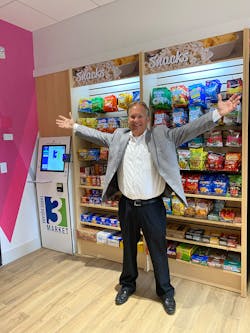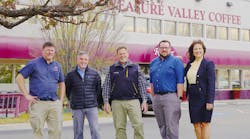Emblazoned in Jim Evans’ memory is the Monday that he drove into his Moonachie, NJ, headquarters after the pandemic quarantine shut down New York. It was a feeling of apocalyptic unknown in what has until that moment been the bustling greater metropolitan area of the city that never sleeps.
“The phone stopped ringing. The roads were empty,” the second-generation operator recalled. “I reached out to some friends in the industry, and we said, ‘What does this mean?’ We all knew it would damage us and that things would not be the same, but we were all wrong about how long it would last. Never did we think it would be over a year, and finally we’re moving in a positive direction. But there’s a long way to go.”
Evans’ essential business clients including manufacturers critical to the supply chain and healthcare facilities remained open, so the provider of vending, micro market and office coffee service didn’t shut down for a single day to continue to serve them.
As operators from coast to coast know all too well, however, the majority of locations that could switch to remote work did, and many have still not reopened. But the return of rush-hour gridlock and ringing phones signals that the return to the workplace is ramping up.
“People have worked from home for 18 months and not experienced the office and many are still afraid to come back,” the vending operator commented. “It’s up to each company to make staff as comfortable as possible and we’re an important part of that process.”
TOUCHLESS IS HERE TO STAY
Some locations Evans Co. serves, especially those that operate on a national or global scale, have addressed pandemic-related health concerns by establishing rules that allow only a certain number of touchpoints from the time employees enter the building until they sit at their desks. As part of the process, a health professional evaluates the breakroom for touchpoints. That includes doorknobs, cooler doors, and vending and coffee machines.
“If the guidelines call for eliminating touchpoints, you can’t eliminate a door or an elevator button, but you can make a coffee machine touchless,” Evans pointed out. “Touchless will appease people who are very concerned until the virus really wanes, and companies will likely want us to provide it for the foreseeable future. Of course, people are going to touch things, but it’s also a liability to employers not to mitigate potential issues and follow protocol.”
The company instituted its own protocol on day one of the pandemic. That includes wiping door handles, social distancing and having only a few pickers working together in the warehouse at a time. It continues to follow these measures for the safety of its employees and customers.
With locations steadily reopening, Evans Co. created a “restart sheet” for its route drivers to follow onsite to ensure a fresh, clean reboot after months of equipment sitting idle. The checklist includes changing filters and thoroughly cleaning machines.
BIG APPLE, BIG IMPACT
Evans pointed out that the New York metro area was especially hard hit not only as the early epicenter of the virus’s spread, but also because of the early statewide shutdown and vast number of white-collar clienteles that had the option to transition to remote work at home.
“I know some operators in Florida who were barely affected since the state never really shut down,” Evans commented. “Our micro market suppliers – Avanti and Three Square Markets – have birds-eye views and said New York and California were the most hammered, partly because of the mandated shutdowns and partly because of the types of clientele we serve. Restaurants and cafeterias in buildings in our market took a big hit. It will take time and be different but we’re in the food and beverage business and people will always need food and beverage and this industry has a history of adapting and reinventing and we will again.”
Evans expressed his gratitude for the ties he has forged with fellow operators over the decades and how they have relied on each other to strategize and for moral support when times are tough.
“I said in April, a month into New York’s quarantine, to an operator friend: ‘I’m not going to go out like this,’ and I meant it,” he recalled. “The industry has survived the financial crisis, Superstorm Sandy, 9/11, which impacted the greater New York City area the worst. We’ve dealt with skyrocketing interest rates and unemployment, recessions, and we survived. Let alone coffee shortages, gas prices, oil embargoes. We survive and then once again we will thrive.”
SHAPE OF THINGS TO COME
“What I think we will see is employers spending more for concessions to entice people to come back to work and feel more comfortable and to make up for closed cafeterias,” Evans predicted. “We’re already seeing it, but we will see it more.”
Fueling the movement at least in the New York metro region is that many tenant leases require foodservice in buildings. When tenants abruptly vacated their offices amid the pandemic, foodservice providers were forced to close. And they are not coming back soon if at all without the onsite workforce required to make their businesses viable, according to Evans.
Since landlords must still fill their contractual obligations to tenants, Evans has had more calls for micro markets and food delivery.
“I visited two places where the main floor was gutted to be set up for communal space,” Evans said. “They’ll have a conference area, bar, pool tables, gym, comfy lounge space and outside space. They asked us to propose markets for those. Some say 50% of the workforce will come back to the office, some say 70%. Landlords are stressed and are using vacant space to make a country club atmosphere and amenities available to bring tenants back and help them entice their employees back.”
Google is credited for beginning the movement to provide such amenities to attract and retain highly sought-after talent which gave rise to the pantry service concept. And tech firms like Yelp and Indeed followed suit. What’s different about the trend emerging now, Evans observed, is that landlords are giving up two floors of a 30-story building to provide all tenants access to a common space.
Locations with less lavish reopening plans also want to feed and please their employees in the post-pandemic metro area.
“One client is bringing back employees in September with micro markets in two locations – one in Manhattan, one in New Jersey,” according to Evans. “They’re looking at foodservice differently. Half of restaurants in some areas are closed. It will get back but not yet because restaurateurs are waiting for people to come back first. The way locations will want to feed people will be different, which includes a shift from bulk bins that had become popular in pantry service to individual snacks and from cafeterias to delivered foodservice.”
Evans’ fresh food comes from three companies throughout New York and New Jersey. One produces only salads; another provides meals and sandwiches; and the third supplies muffins and cakes.
Evans Co. is developing an “Uber Eats-type concept,” that is modified to tie in with and redefine lunchrooms or onsite cafeterias. The plan is for the new service to involve one person delivering cold or hot meals all at the same time daily, rather than employees ordering at different times from different places and receiving orders from multiple delivery people.
“Avanti is working on software to handle it and we expect to see it come to fruition especially in Manhattan,” Evans commented.
Evans is confident that micro markets will remain the strongest sector of the industry moving forward, and just wrapped up four installations in the month of June alone.
“I see micro markets really benefitting from the post-COVID-19 climate,” Evans predicted. “Manual foodservice is not coming back because staffing is not there to justify it. It’s easy for employers to provide a micro market and incentivize employees with a meal allowance or subsidy.”
A newer opportunity for micro markets that’s been gaining traction is at residential complexes where property managers want to attract high-quality, long-term tenants to their communities.
“As more and more condos and complexes pop up throughout the New York, New Jersey and Connecticut tri-state region, properties are looking for ways to distinguish themselves from one another,” he remarked. “Our ‘self-pay convenience stores’ benefit their community's residents by offering fresh quality food, toiletries, snacks and beverages, medicines, batteries and toilet paper literally just steps away from their homes.”
TOTAL REFRESHMENT SOLUTIONS
Despite micro markets taking the spotlight these days, vending still has its place and always will, Evans stressed. His company has several hundred in operation, all equipped with the latest technology including remote machine monitoring and cashless payment.
“We still put out vending machines, all the time. Throughout the pandemic, we installed vending machines in convention centers that were used as temporary hospitals; that’s just one example of the many places ideal for vending,” Evans reported. “Vending is not going away and there are many places where micro markets don’t work.
Evans is also changing the way our clients think about vending as we are committed to better understanding their needs and goals for wellness in the workplace and providing alternative choices to support a healthy lifestyle.”
Office coffee service is another door opener for Evans. The OCS segment took the biggest hit from the pandemic, but providing quality coffee that rivals local coffee shops to reward discerning employees and encourage them to remain onsite is still a given for most offices as they reopen.
“One office coffee service program does not fit the many unique businesses in the New York Metro area. That's why we have varied, flexible coffee program options to fully meet the needs of our customers with individualized attention, service and product lines,” Evans said.
That includes Cafection and Starbucks bean-to-cup machines, Newco’s CX Touch pod brewer and the Lavazza and Flavia Barista authentic espresso machines for a full range of coffeehouse favorites. Most are now equipped with touchless technology.
With premium coffee in high demand, Evans’ offers a wide range, from national names like Peet's, Green Mountain and Starbucks to local roaster favorites like Grammercy Park and Lacas Coffee.
Evans rounds out its coffee service with more than 3,500 breakroom products, including cold beverages, snacks and fresh fruit, along with janitorial and first-aid supplies, as well as sundries.
GOING GREEN
The operator noted that during the financial crisis of the mid-2000s, locations became less focused on the environment, but it’s since resurfaced as a central focus in the breakroom. That’s a trend clearly here to stay.
Evan’s eco-friendly repertoire includes Greenware plates and bowls made from biodegradable sugarcane and Solo Bare cups made of post-consumer fiber, and facial tissues, napkins and paper towels made from recycled paper from Certo Products.
Point-of-use water filtration is increasingly favored for its sustainability by eliminating the carbon footprint throughout the supply chain that is inherent with bottled water, along with its ease of use. Evans is an expert at assessing each location’s needs and providing the required solutions, including UV purification, carbon filtration and reverse osmosis.
A shining star in its water offerings is the Bevi filtered water machine that allows users to build their own customized still and sparkling waters with unsweetened, zero-calorie, or organically sweetened flavors.
Evans also offers its own proprietary spring water from the Nescopeck Mountains of Pennsylvania.
THE BIG PICTURE
Evans Co. services some 2,000 corporate accounts of all sizes and in all sectors in the greater New York and New Jersey metropolitan area, including Fortune 500 companies, manufacturing, technology, healthcare, construction, education, hospitality and government.
The company began in the basement of the Evans family home in Moonachie in 1960, when Jim’s father, Edward, who was only 19, invested $500 in a mobile catering truck, a novel concept at the time.
A customer request led the mobile caterer into vending and soon after into office coffee service, which was another pioneering concept in the 1970s.
“Coffee remains a big part of our business and made us who we are. It created the most in the way of opportunity,” Jim recalled.
Ed Evans worked as the salesman, the routeman and the technician, while his wife Mildred handled the paperwork and ran a home daycare service to make ends meet before the company grew exponentially and prospered.
Mildred and Edward built Evans Co.’s current 16,000-sq.ft. building in 1980, which included a commissary. By the end of the decade, with fast-food options abounding on every corner, they exited mobile catering, but fresh food remained a focal point and the Evans operation continued to run its commissary to provide quality foods for vending machines. The Evans also operated several cafeterias and won the coveted business to provide meals to Amtrak.
But over time, with increased competition from fast food, just as happened with mobile catering, the foodservice segment became stagnant while the coffee business boomed. So, Evans closed its commissary and outsourced its fresh food to make way for more warehousing for its OCS and vending business.
Jim joined the family business at 23 years old straight out of college. He took the reins in 2011 and continues his parents’ customer-centric legacy.
“We are the refreshment professionals, offering white-glove service,” Jim underscored. “We've been refreshing businesses since 1960, always bringing in what is new while maintaining the old-fashioned quality and service they deserve.”
The Evans family's vision is shared by a staff of 30, who the second-generation operator credited for constantly thinking up new and exciting ways to keep its customers happy. The company was forced to reduce its staff as a result of the pandemic but has been rehiring as it rebounds.
“Our friendly and knowledgeable team is committed to serving with skill and problem-solving tenacity, we cherish this spirit, as it constantly drives us to improve,” Evans commented. “Some of our best ideas come from our team in the field, solving problems they are up against every day. and these ideas transform not just our own company, but the entire industry. We are a better company today because of the people we have, and the innovation we create together.”
THE POWER OF SOCIAL MEDIA
Evans has worked closely with a New Jersey-based marketing company that over the past few years has to increase its social media presence to grow its brand through awareness and by increasing shares and followers on its social media platforms. Its social media effort proved especially valuable to keep connected with its clients and customers throughout the pandemic.
“We engage our customers; they are our best advocates. We use social media to listen to both our current and future customers,” Evans said. “We love comments, mentions and likes. We are looking to drive more leads and sales though web clicks, mail signups and such. We improve customer retention through testimonials and support through social media.”
He added that Evans’ page ranks are up, and its social media content has significantly improved. The results are more leads and more sales.
Monthly meetings with the marketing company help gauge what is and is not working and set short- and long-term goals.
TURNING THE TIDE
“I can’t tell you as we sit here this day in June that I have all the answers. But I have the questions that locations are starting to ask for services and products in our space…but outside the realm of what we did,” he said. “We have to answer and provide solutions no matter what it is, but I don’t know what that is now. Their questions will guide us.”
He emphasized that all great sports figures and businesspeople from George Foreman and Mohammad Ali to Tom Brady and Lee Ioccoca have reinvented themselves to come back from adversity.
With 2020’s pandemic challenges rippling from the shutdown easing, 2021’s biggest challenges are labor shortages and supply chain issues, Evans thinks.
“I need more labor – techs, drivers, warehouse, sales, pickers -- after having to lay off employees at the beginning,” he said. “It’s a sign that things are coming back, but it’s a challenge the whole country in every industry is facing.”
One thing he’s sure of is a comeback is under way.
“I love this industry and the people in it and we’re coming back. It will be different and smaller, but the people who survive will be stronger than ever,” Evans concluded. “It’s a positive move forward for the industry and country as we get back to our lives and work.”
Operation snapshot
Headquarters: Moonachie, NJ
Year founded: 1960
No. of employees: 30
No of routes: 9
No of vending machines: 500
No. of micro markets: 20
Equipment providers: Crane Merchandising Systems, Fastcorp, Newco, Keurig, Flavia, Lavazza, Bevi, Elkay Smartwell, Nespresso, Cafection
Tech providers: Avanti Markets, Three Square Markets, Cantaloupe

Emily Jed
Emily Jed is a business journalist who has devoted much of her career to covering the convenience services industry. She is a contributing editor to Automatic Merchandiser/VendingMarketWatch.com.







